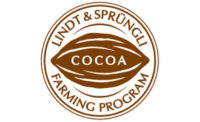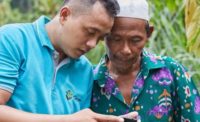
|
|
Lindt & Sprungli is substantially upscaling and extending its farming program in Ghana. Photo provided. |
Lindt & Sprungli is investing heavily into Ghana with hopes of being able to verify its entire cocoa beans supply chain from the country by 2016.
By then, the chocolate company also hopes to help more than 45,000 farmers in Ghana.
Lindt & Sprungli sources 100 percent of its West African cocoa bean supply from Ghana because of the high quality of cocoa beans in the region. The purchasing model not only guarantees a consistent volume of best quality cocoa beans for the chocolate company, but, through traceability, also the opportunity to positively influence local development.
Over the next few years, the cocoa company hopes to help farmers in the country, and improve farming practices, with the goal of doubling their yield and increasing the family farm income considerably.
The farming program includes introducing detailed farm mapping, training farmers and creating farmer-led nurseries with improved planting materials.
The farmers also will have access to credit for planting appliances in newly set-up farm shops. And, a Village Resource Center will also be installed in each district, if there’s isn’t one there already.
In 2012, 8,000 farmers already benefited from a pilot program, and 5,000 farmers will be joining the program in the 2013-2014 season. An additional 25,000 farmers are expected to join during the following three years.
By 2016, Lindt & Sprungli plans to have the training program completed for all the farmers in Ghana who deliver cocoa in the framework of its special purchasing model.
By paying a voluntary premium per each ton cocoa beans sourced, the company has invested $5 million in infrastructure and social projects via the non-profit organization "Source Trust" so far.
The money has been used to reconstruct a school, purchase mosquito nets, create access to clean drinking water. They’ve also built Village Resource Centers, which is equipped with computers, a printer and internet access. It’s used by students and teachers alike for education, and also by farmers for training.
The project, resulting from the payment of another $10 million and initial set-up costs, will be further enhanced to increase young adults and women farmers' access to services, while improving their knowledge and leadership skills.
This program is strengthened by an internal monitoring system, which will assist in measuring progress with regards to good agricultural, social, environmental and business practices of farmers, while external audits will enable the progress made to be verified.
This program is supported by The Sustainable Trade Initiative (IDH), an organization with the aim of upscaling and accelerating sustainable trade. IDH is funded at the institutional level by the Dutch and Danish government, and by SECO, the Swiss State Secretariat for Economic Affairs.
The up scaling and extending of the Lindt & Sprungli farming program is done in partnership with the Ghana Cocoa Board (government partner), the Cocoa Research Institute of Ghana (government partner) and Source Trust Ghana (implementation partner).
Lindt & Sprungli is one of the few chocolate makers that have complete control over every step of the production chain starting with the selection of the finest cocoa varieties from the best growing areas in the world right on through careful processing and ending with packaging.
To safeguard the uniform and consistently high quality of all Lindt & Sprungli chocolate products, all ingredients are thoroughly tested in the company’s laboratories before and after purchase, so that their quality constantly meets the highest standards.
Lindt & Sprungli is the worldwide leader in the premium chocolate segment and was founded more than 165 years ago in Zurich.
The company’s quality chocolate is manufactured in it’s eight production facilities in Europe and the United States and is sold by 20 subsidiaries as well as a widespread network of independent distributors around the world. The Lindt & Sprungli Group employs more than 8,100 people and had 2.67 billion Swiss francs in sales in 2012.







